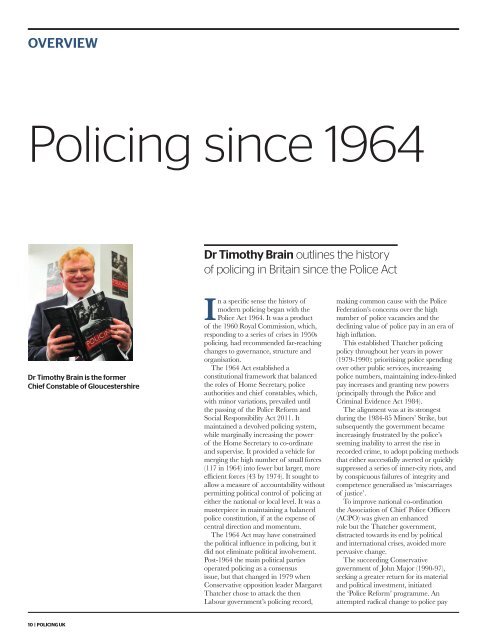Policing UK 2013 - Police Federation
Policing UK 2013 - Police Federation
Policing UK 2013 - Police Federation
Create successful ePaper yourself
Turn your PDF publications into a flip-book with our unique Google optimized e-Paper software.
OVERVIEW<br />
<strong>Policing</strong> since 1964<br />
Dr Timothy Brain outlines the history<br />
of policing in Britain since the <strong>Police</strong> Act<br />
Dr Timothy Brain is the former<br />
Chief Constable of Gloucestershire<br />
In a specific sense the history of<br />
modern policing began with the<br />
<strong>Police</strong> Act 1964. It was a product<br />
of the 1960 oyal Commission, which,<br />
responding to a series of crises in 1950s<br />
policing, had recommended far-reaching<br />
changes to governance, structure and<br />
organisation.<br />
The 1964 Act established a<br />
constitutional framework that balanced<br />
the roles of Home Secretary, police<br />
authorities and chief constables, which,<br />
with minor variations, prevailed until<br />
the passing of the <strong>Police</strong> eform and<br />
Social esponsibility Act 2011. It<br />
maintained a devolved policing system,<br />
while marginally increasing the power<br />
of the Home Secretary to co-ordinate<br />
and supervise. It provided a vehicle for<br />
merging the high number of small forces<br />
(11 in 1964) into fewer but larger, more<br />
efficient forces (43 by 194). It sought to<br />
allow a measure of accountability without<br />
permitting political control of policing at<br />
either the national or local level. It was a<br />
masterpiece in maintaining a balanced<br />
police constitution, if at the expense of<br />
central direction and momentum.<br />
The 1964 Act may have constrained<br />
the political influence in policing, but it<br />
did not eliminate political involvement.<br />
Post-1964 the main political parties<br />
operated policing as a consensus<br />
issue, but that changed in 199 when<br />
Conservative opposition leader Margaret<br />
Thatcher chose to attack the then<br />
Labour government’s policing record,<br />
making common cause with the <strong>Police</strong><br />
<strong>Federation</strong>’s concerns over the high<br />
number of police vacancies and the<br />
declining value of police pay in an era of<br />
high inflation.<br />
This established Thatcher policing<br />
policy throughout her years in power<br />
(199-1990) prioritising police spending<br />
over other public services, increasing<br />
police numbers, maintaining index-linked<br />
pay increases and granting new powers<br />
(principally through the <strong>Police</strong> and<br />
Criminal Evidence Act 194).<br />
The alignment was at its strongest<br />
during the 194-5 Miners’ Strike, but<br />
subsequently the government became<br />
increasingly frustrated by the police’s<br />
seeming inability to arrest the rise in<br />
recorded crime, to adopt policing methods<br />
that either successfully averted or quickly<br />
suppressed a series of inner-city riots, and<br />
by conspicuous failures of integrity and<br />
competence generalised as ‘miscarriages<br />
of justice’.<br />
To improve national co-ordination<br />
the Association of Chief <strong>Police</strong> Officers<br />
(ACPO) was given an enhanced<br />
role but the Thatcher government,<br />
distracted towards its end by political<br />
and international crises, avoided more<br />
pervasive change.<br />
The succeeding Conservative<br />
government of ohn Major (1990-9),<br />
seeking a greater return for its material<br />
and political investment, initiated<br />
the ‘<strong>Police</strong> eform’ programme. An<br />
attempted radical change to police pay<br />
10 | POLICING <strong>UK</strong>
















